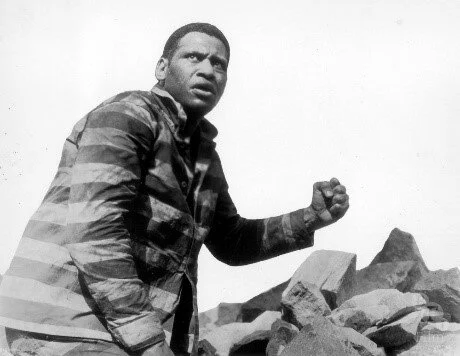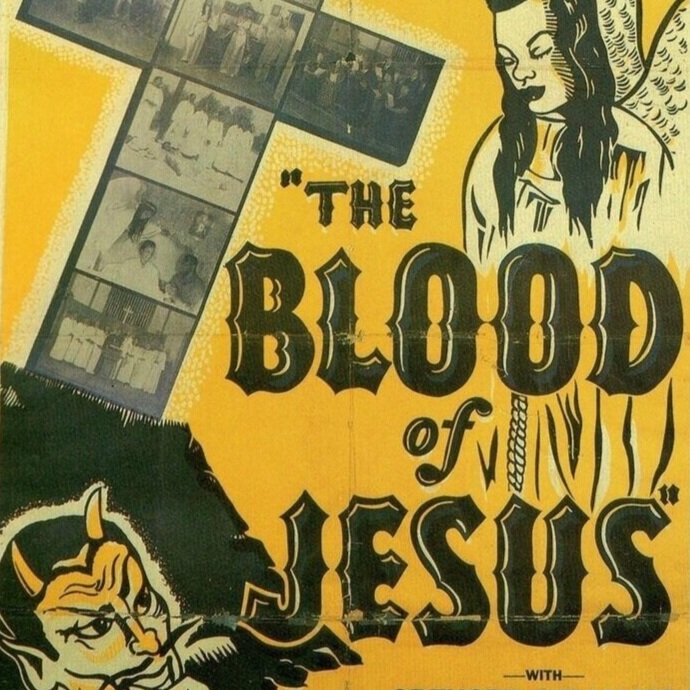
The Emperor Jones
with an introduction by Michael C. Reiff
The Emperor Jones (1933) is an iconic work in the race films period and in the history of American cinema. On the one hand, it features a groundbreaking performance by Paul Robeson, a role that would launch him to stardom in a time when black performers were relegated to bit parts in “mainstream” Hollywood. On the other hand, the film is populated with problematic elements from the language in the script to the “jungle motif” in the second half of the film, elements Robeson himself critiqued. In the end, this historic film contains multitudes.
Plot
After winning a coveted position as a Pullman railway porter and receiving a rousing send-off from his Baptist church congregation, Brutus Jones falls under the influence of a shady fellow porter. Introduced to various dishonest practices, Jones is soon incarcerated and sentenced to perform hard labor; but after retaliating against a brutal white prison guard, he escapes and eventually makes his way to a small Caribbean island. There, he uses his cunning and a little “magic” to establish himself as “Emperor,” a position which he enjoys (and from which he profits) for several years. But ultimately Jones is unable to escape the visions from his past, which haunt him and bring about his tragic end.
Significance in Race Film History
Loosely based on Eugene O’Neill’s award-winning 1920 play, The Emperor Jones–which was filmed at the Kaufman Astoria studio in New York City, with outdoor scenes shot at New York’s Jones Beach—provides an interesting example of a pre-Code film adaptation produced outside the Hollywood studio system. The film, which reflects the intense racism of the 1920s and early 1930s, is peppered with casual and demeaning epithets of blacks; and it suggests that Brutus Jones is little more than the “brute” that his name connotes. It also reinforces the libidinal power of the black man (vividly conveyed by the numerous and surprising scenes of shirtless lead actor Paul Robeson) and many of the other stereotypes that dated back to the late nineteenth-century stage productions but found new life on the early movie screens. The film’s blacks are portrayed as superstitious and gullible or, alternatively, shifty, treacherous, and ultimately murderous; and, as a race, they are depicted as innately inferior to whites (particularly the colonist Smithers, the only white character on the island). The film thus served as an example of the unfortunate “jungle tradition” of movies that became so popular in the 1930s, in which “barbaric” blacks required the civilizing hand of whites—a depiction that was in marked contrast to most of the early race films, which emphasized the notion of racial ambition and uplift.
Nonetheless, as the first mainstream American film to bring a leading black actor to both white and black audiences alike on American movie screens, The Emperor Jones occupies a singular and well-deserved place in cinema history. Through his astounding performance as Brutus Jones, Paul Robeson was able to transcend the limitations of the film and to critique the issues of the time, paramount among them the mask of capitalism and the exploitation of blacks. His final dramatic monologue remains a highlight of early sound film acting.
A distinguished singer, actor, and political activist, Robeson was among the first major performers to refuse to play live to segregated audiences. Even after being blacklisted and condemned by the press for his Soviet sympathies and having his passport cancelled, he maintained his activism throughout his lifetime.
- Barbara Tepa Lupack
“The Emperor Jones was a landmark film for American cinema. The first mainstream American film to cast a black leading actor, it featured the iconic career-making performance by Paul Robeson as the Emperor Jones and brought a leading black actor to white and black audiences alike on the silver screen.”
— Michael C. Reiff
PROGRAM LECTURER
Michael C. Reiff
“Paul Robeson in The Emperor Jones”
Michael C. Reiff is the English Department Leader at Ithaca High School in Ithaca, New York, where he teaches Film and Literature courses. Reiff also teaches Film and Writing courses through Cayuga Community College, Tompkins Cortland Community College, and Cornell University. Reiff has published essays, articles, and fiction in various books, journals, and anthologies. He also lectures on film and history in Auburn, New York, where he lives with his wife, two children, and cat.
Film Credits
Cast: Paul Robeson (Brutus Jones), Dudley Digges (Smithers), Frank H. Wilson (Jeff), Fredi Washington (Undine), Ruby Elzy (Dolly), George Haymid Stamper (Lem). Uncredited: Brandon Evans (Carrington), Taylor Gordon (Stick-Man), Billie Holiday (extra in nightclub scene), Rex Ingram (Court Crier), Moms Mabley (Marcella), Harold Nicholas (young tap dancer), and Fritz Pollard and Lorenzo Tucker (extras in night club scene).
Director: Dudley Murphy, William C. de Mille (uncredited). Writing credit: Eugene O/Neill (play), DuBose Heyward (screenplay). Producers (uncredited): Gifford Cochran and John Krimsky.












